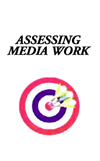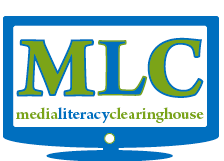List of recommended media literacy rubrics
Assessment in Media Literacy
Chris Worsnop’s Web page on media education assessment (hosted by the Media Awareness Network) can be found here.
In addition, background on Chris’ work and more on assessment can be found at the Reading OnLine web page
Seven States Say They Assess Media Literacy (SETDA)
WORKSHOP REPORT: How to do Assessment and Evaluation in Media Literacy
Assessing Media Work: Authentic Assessment in Media Education
The Media Literacy Learning Continuum
Recommended text:
|
Assessing Media Work:
Authentic Assessment in Media Education By Chris M. Worsnop. Wright Communications, Mississauga, 1997. $59.95
 A clear, valid and reliable system of assessment is crucial if media courses A clear, valid and reliable system of assessment is crucial if media coursesare to be seen as legitimate and worthwhile. Assessing Media Work offers such an evaluative framework. Drawing on his extensive experience in portfolio and writing assessment, Chris Worsnop explains assessment and evaluation issues and practices in practical terms. This book includes detailed assessment rubrics and other instruments that can be used—or adapted for use—in any classroom.Educators who purchase Assessing Media Work will also receive a duplication licence for use throughout their school community. Wright Communications also offers full- or half-day training workshops conducted by the author. Assessing Media Work can be ordered through Wright Communications: Unit 6, Suite 107 |
Portion of an email (May 2004) response from Chris regarding media education…
Tom Goodkind phrases the assessment question well when he puts it: “to have some clear indications that our media literacy efforts with children and youth have actually had some recognizable impact, whether in terms of knowledge, thinking, or resulting activities and actions.”
I particularly like the distinction between knowledge and thinking. Personally, I would discount knowledge except as a component of thinking. Knowledge on its own suggests some sort of E.D. Hirsch Jr world of “Cultural Literacy”, which, frankly, churns certain of my interior organs.
When it comes to “resulting activities or actions” there is really no consensus on what the activities and actions are intended to be. Some people look to media education as a cure for obesity, narcissism, violent behaviour, “inappropriate” sexual activity, and so on, (and so on.) My read on that is that the activities and actions being sought and “assessed” are not media education actions and activities at all, but perhaps activities and actions related to guidance education, health education, civics, religious education, etc. from classrooms where some of the paraphernalia of media education has been present and has been used for purposes other than media education.
In a media education classroom, the activities and actions might reasonably be expected to relate to media.
My hope would be that successful media students would pass the course in media education. That would be a very good indicator. In my opinion, the teacher is the best judge of who should pass the course.
Passing the course, naturally, would have to entail some assessment of a kind that actually valued the knowledge-and-thinking (I connected these with hyphens to indicate that assessing them separately is “not on”) and actions and activities we want to flow from the very best media course:
- Ability to express (and explain) preferences in media taste and to appreciate other people’s preferences
- Critical understanding of media texts, and the ability to express that understanding (not necessarily in a school essay) as separate from a personal or group preference
- An involvement with media that goes beyond the casual (albeit heavy) consumption of media texts for pleasure, without denigrating that kind of media consumption
- As broad as possible experience with media leading to understanding of cultures of other countries
- The ability to appreciate the process of media production through developing skills in some of the many roles of media production (working solo and in groups at: scripting, writing, story boarding, directing, lighting, editing, marketing, planning, documenting, organizing, page-making, photographing, creating graphics, cartooning, etc., etc.) as demonstrated in production work submitted for assessment
How do we assess these? Tom Goodkind has pointed out the dangers of running off to the shrine of the empirical tradition as exemplified by the testing industry now affianced to the “standards movement”. So I will not rant on along those same lines. Let me suggest, though, a possibly radical solution:
Develop performance activities that entail the desired outcomes and make those the tests. Put the time and money into a strong system of authentic assessment, instead of building the bulwarks of machine-scored testing higher still. Use the science and budget of assessment in administering and moderating the marking of real-life performance tasks nation wide.
They do it elswhere.
Cheers,
Chris
Share This Page:


